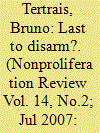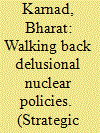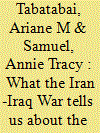| Srl | Item |
| 1 |
ID:
077793


|
|
|
|
|
| Publication |
2007.
|
| Summary/Abstract |
France still sees its nuclear arsenal as essential both as insurance against future major risks and as support for an independent foreign policy. There is a wide consensus in the country to maintain a nuclear deterrent, both among political parties and the general public. A modernization program is under way that will ensure the continued efficacy of the French nuclear force well into the 2030s, and France has adopted a fairly restrictive interpretation of its disarmament commitments under the Treaty on the Non-Proliferation of Nuclear Weapons. This suggests that the likeliest future direction of France's nuclear policy is conservatism. However, other scenarios remain possible, especially in the domain of transatlantic and/or European cooperation
|
|
|
|
|
|
|
|
|
|
|
|
|
|
|
|
| 2 |
ID:
150163


|
|
|
| 3 |
ID:
158997


|
|
|
|
|
| Summary/Abstract |
India’s ‘dual use’ nuclear policy has been strung out from the beginning between the peaceful atom and military atom as illustrated in Jawaharlal Nehru’s use of the phrase for the country’s nuclear energy programme—‘Janus-faced’. However, the Indian Government has been too influenced by its own rhetoric of peaceful use to equally emphasise the security aspects that the phrase implied.
|
|
|
|
|
|
|
|
|
|
|
|
|
|
|
|
| 4 |
ID:
153633


|
|
|
|
|
| Summary/Abstract |
The 1980–88 Iran-Iraq War stands as the pivotal event for Iran's national security strategy, especially as it pertains to the country's controversial nuclear program. The “imposed war,” as it is known to Iranians, caused Iran to view itself as isolated and on the defensive, striving for self-reliance and survival in what it continues to perceive as an unjust international order. The war has shaped both Iran's strategic outlook generally and its nuclear policies specifically. It was a decisive factor in determining the nature and scope of Iran's nuclear activities, as well as in Iran's approach to the international negotiations surrounding those activities, which in 2015 produced the Joint Comprehensive Plan of Action. Both during those talks and after the implementation of the deal began, Iranian decisionmakers regularly invoked the history and lessons of the war to construe their decisionmaking process and define their bottom lines. Yet the war and its implications for Iran's strategic culture and nuclear thinking remain understudied and misunderstood. If the implementation of the deal and a longer-term resolution of the conflict over Iran's nuclear program are to succeed, the history of the Iran-Iraq War and the vital lessons that Iran has drawn from it must be appreciated.
|
|
|
|
|
|
|
|
|
|
|
|
|
|
|
|